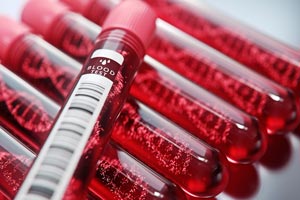What is a Liquid Biopsy for Cancer?
This new blood test for cancer detection and treatment monitoring is simple, fast, accurate, and non-invasive!
What is a Liquid Biopsy?
A Liquid Biopsy is a simple blood test that checks your blood for tumor DNA to tell us what mutations may be driving your cancer. The concentration of tumor DNA in your bloodstream tells us how advanced your cancer is and if your treatment is working.
 Most of the time when a biopsy is performed, it’s to test the tumor tissue for cancer cells. However, science has evolved so that now we don’t need to take a tissue biopsy from a cancer patient in order to ensure they are getting the best possible care! Instead, we can now use a simple blood test to look for these cancerous cells and find out which mutations are making them grow.
Most of the time when a biopsy is performed, it’s to test the tumor tissue for cancer cells. However, science has evolved so that now we don’t need to take a tissue biopsy from a cancer patient in order to ensure they are getting the best possible care! Instead, we can now use a simple blood test to look for these cancerous cells and find out which mutations are making them grow.
It’s recently been discovered that every cancer tumor naturally sheds some of its mutated cell DNA into the bloodstream. Cancerous tumor cells release mutated DNA into your bloodstream in discrete packages called exosomes. These exosomes travel throughout the body and turn normal healthy cells into cancerous cells. Meanwhile, your normal/healthy cells release the normal versions of the same DNA (via exosomes) in order to counteract the cancer causing exosomes.
 “Of patients with targetable mutations that were identified via liquid biopsy, 86% achieved either a complete response, partial response, or stable disease, patients whose actionable mutations were detected by the liquid biopsy responded favorably to targeted therapies.” 1
“Of patients with targetable mutations that were identified via liquid biopsy, 86% achieved either a complete response, partial response, or stable disease, patients whose actionable mutations were detected by the liquid biopsy responded favorably to targeted therapies.” 1
Why an LBL Liquid Biopsy is Better Than the Rest
A Liquid Biopsy Labs test is the only liquid biopsy test that checks your blood and measures the ratio of the key mutations that drive your cancer in these two competing exosomes (cancerous and non-cancerous) to determine if there’s an increase in the metastatic process. Other liquid biopsies only measure the total amount of circulating DNA – which can be from dead tumor cells, active tumor cells, or exosomes.
Liquid Biopsy Labs’ liquid biopsy process can be used for diagnostics and early detection – and is also highly effective when the genetic sequencing of a person’s cancer has already been completed and we want to ensure their targeted therapy or immunotherapy treatment is working.
Liquid biopsies can identify cancer-causing mutations in as little as 0.02% of your total DNA. This means it can tell you when a tumor is present in your body before it shows up on even the most advanced imaging tools, such as PET/CT.
An LBL Liquid Biopsy Can be Used To:

- Identify inherited mutations that might contribute to cancer later in life.
- Show how effective a patient’s treatment is, within just 3 weeks of your first treatment.
- Show if a patient’scancer is starting to come back – much earlier than any other diagnostic test, worldwide.
- Determine if Immunotherapy will work for a patient, and how well that Immunotherapy is working.
- Find new mutations that could be driving a patient’s cancer, so we can find the best targeted treatment.
- Ensure that a doctor can tell the difference between tumor growth and pseudoprogression (i.e. when tumors appear larger in size, but are actually dead or dying).
A simple blood test shows you whether your cancer is growing, slowing, or gone!
Order a Liquid Biopsy Test
Avoid misdiagnosis and incorrect treatment plans
Learn More About Precision Oncology

For individuals with cancer, please visit our sister site, Cancer Treatment Options and Management, for Precision Oncology services designed just for you and your care team. CTOAM will coordinate your precision diagnosis – including your personalized liquid biopsy tests – and develop a targeted therapy plan based on what is truly causing your cancer to grow. Cancer Treatment Options and Management will partner with your oncologist to administer and monitor the very best treatment for your cancer.
See how Liquid Biopsy fits into the Four Pillars of Precision Oncology…
Footnotes
- Winslow, Ron. The Race to Diagnose Cancer with a Simple Blood Test. (2019)